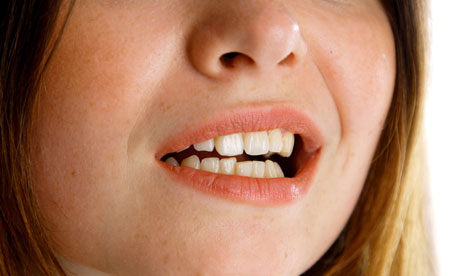 Bruxism, or simply teeth grinding, is the involuntary clenching and grinding of teeth which can either occur during sleep or daytime. The former type of bruxism known as nocturnal bruxism is a common disorder; in fact a majority of people suffer from bruxism at least once in their lives. However, when the problem becomes frequent, aggressive grinding may take place which can have a damaging effect on the teeth. According to dentists in Diamond Bar CA, bruxism is one of the most common causes of tooth decay and damage.
Bruxism, or simply teeth grinding, is the involuntary clenching and grinding of teeth which can either occur during sleep or daytime. The former type of bruxism known as nocturnal bruxism is a common disorder; in fact a majority of people suffer from bruxism at least once in their lives. However, when the problem becomes frequent, aggressive grinding may take place which can have a damaging effect on the teeth. According to dentists in Diamond Bar CA, bruxism is one of the most common causes of tooth decay and damage.
What causes bruxism?
The root cause of bruxism is mainly psychological. However, genetics and some physiological and environmental conditions can also lead to the problem. Diamond Bar Dentists are not yet sure about the exact reason for bruxism, but they too are of the opinion that the disease is related to psychological and physiological stress. Most people, who suffer from anxiety, might end up grinding their teeth involuntarily during day as well, especially when they face a stressful situation. Bruxism can also occur in people who are passive aggressive or have severe temper issues. Suppressed anger and frustration can lead to severe psychological stress which can then lead to involuntary teeth grinding during sleep.
Apart from psychological stress, bruxism can also be caused due to certain physiological malfunction. Reaction to certain kind of medication like antidepressants along with poor nutrition and lack of essential nutrients may also result in teeth grinding. Bruxism might also be caused due to an untreated ear and tooth infection. Smoking, alcohol consumption and usage of some recreational drugs can also trigger bruxism.
How to know you have bruxism?
Although daytime bruxism becomes evident, dentists in Diamond Bar CA believe that nocturnal bruxism can be hard to detect, especially at an early stage. Most people with nocturnal bruxism are unaware of their condition unless they are told by someone or the problem becomes too severe. If you wake up every morning with a throbbing pain in the jaw or you have tooth decay despite of good health and excellent oral hygiene, chances are that you suffer from bruxism.
What are the effects of bruxism on oral health?
Diamond Bar dentists are of the opinion that severe teeth grinding can corrode the enamel which can lead to tooth decay. When the teeth are constantly grated against each other, the enamel starts to soften and chip off. The continual softening of enamel slows down the process of natural remineralization. Due to softened enamel, plaque starts to accumulate, bacteria begin to thrive and cavities start to form. Apart from that, teeth grinding can also cause inflammation and soreness in the gums.
Severe bruxism can also result in chipping and breaking of the teeth. Aggressive grinding weakens the basic carcass of the teeth. With a weak frame, the entire structure of the teeth begins to crumble which can result in tooth wear and breakage. A common disorder of teeth joint known as temporomandibular joint disorder is also one of the long term effects of bruxism.
If you find any of the symptoms of bruxism manifesting, you should immediately consult your dentist in Diamond Bar CA before the problem gets complicated.